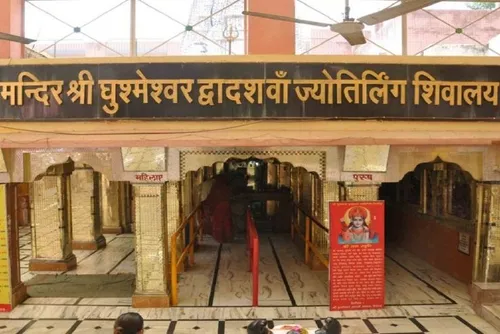
Sacred Beauty of Ghushmeshwar Temple in Sawai Madhopur
Nestled amidst the serene landscapes of Sawai Madhopur, the Ghushmeshwar Temple is a hidden gem that beckons both spiritual seekers and history enthusiasts. This ancient shrine, dedicated to Lord Shiva, is not just a place of worship but a testament to the rich cultural and architectural heritage of Rajasthan.
Location: A Tranquil Retreat in Sawai Madhopur
The Ghushmeshwar Temple is situated in the Sawai Madhopur district of Rajasthan, India. This region, renowned for its lush greenery and historical significance, provides the perfect backdrop for the temple’s spiritual ambiance. The temple is located about 40 kilometers from the bustling city of Sawai Madhopur, making it an accessible retreat from the urban hustle.
To reach the temple, visitors can follow these directions:
- From Sawai Madhopur City Center: Head southeast on the NH 52 for approximately 30 kilometers.
- Turn Left: Follow the signs to the local roads leading to the temple.
- Local Directions: Once on the local road, the temple is well-signposted, guiding visitors through scenic routes that enhance the journey.
Architectural Marvel: A Glimpse into History
The Ghushmeshwar Temple, with its ancient architecture, is a splendid example of traditional Rajasthani temple design. The temple’s intricate carvings and sculptures reflect the skill and artistry of the bygone era. As you approach the temple, the towering spires and detailed stonework immediately capture your attention, offering a visual feast of historical craftsmanship.
The temple’s sanctum sanctorum houses a sacred Shiva Linga, which is the focal point of worship. The serene environment and the temple’s aura create a peaceful atmosphere for devotees and tourists alike. The surrounding landscape, with its lush greenery and tranquil setting, adds to the temple’s spiritual charm.
Cultural and Spiritual Significance
The Ghushmeshwar Temple holds a significant place in the local culture and spirituality. Dedicated to Lord Shiva, the temple is a revered site for pilgrims seeking blessings and solace. The annual festivals and special poojas conducted at the temple draw devotees from across the region, creating a vibrant atmosphere of devotion and celebration.
Local legends and folklore enrich the temple’s historical narrative, adding layers of mystique and reverence. Visiting the temple offers a unique opportunity to immerse oneself in the spiritual traditions and cultural heritage of Rajasthan.
Nearby Attractions: Enhancing Your Visit
While the Ghushmeshwar Temple is a destination in itself, exploring the nearby attractions can enhance your visit:
Ranthambore National Park: Just a short drive from the temple, this famous wildlife sanctuary is home to tigers and diverse flora and fauna. A visit to the park offers a chance to experience the natural beauty and wildlife of the region.
Ranthambore Fort: This historic fort, a UNESCO World Heritage Site, provides a glimpse into the region’s rich history and offers panoramic views of the surrounding landscape.
Chauth Mata Temple: Located in the nearby village of Chauth, this temple is another significant religious site dedicated to the goddess Chauth Mata.
Tips for Visitors
Best Time to Visit: The ideal time to visit the Ghushmeshwar Temple is during the cooler months from October to March. The weather is pleasant, making the journey and exploration more enjoyable.
Dress Code: As with most religious sites, it is advisable to dress modestly and respectfully.
Local Cuisine: Don’t miss the opportunity to try local Rajasthani cuisine at nearby eateries. The traditional dishes offer a delightful culinary experience.
In conclusion, the Ghushmeshwar Temple in Sawai Madhopur is a captivating destination that combines spiritual significance with architectural beauty. Its tranquil setting and rich cultural heritage make it a must-visit for anyone traveling through Rajasthan. Whether you are seeking spiritual solace or exploring historical treasures, the Ghushmeshwar Temple promises an enriching experience.
